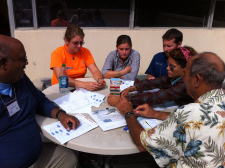| |  |
| Activities that model impacts of ocean acidification on marine food webs: teachers engaged in a Jenga game that has been modified to represent a marine food web |
This fall, COSEE-West organized and presented a workshop (Ocean Acidification Workshop: Using What Works) for teachers that integrated a suite of models and approaches that had been developed over its 10-year tenure. The workshop included structural components from lectures, workshops, courses, classes, and partnerships that have proven valuable for communicating ocean science to educators. The various components complemented one another and the new structure of the workshop proved to be a practical and versatile design. Some of the protocols that were combined for this workshop were:
Topic: The topic of ocean acidification was chosen based on surveys and discussions with formal and informal educators, and on the availability of new research results.
Presenters: We sought an inspiring role model in the field of ocean science, and were fortunate in engaging Dr. Anita Leinweber of UCLA to present about ocean acidification. We also had an undergraduate student in marine science speak to the teachers about how to spark students’ interest in pursuing science in college.
Translating science: We conferred with Dr. Leinweber as she developed her presentation, and reviewed it before the workshop for clarity. Technical terms were compiled into a glossary for participants. In addition, Linda Chilton of USC Sea Grant reported on the science presentations at the International OA Symposium that she had just attended and shared the teaching ideas developed by a team of educators there.
Participants: We invited teachers of different grade levels and provided differentiated activities for each level as well as modifications for informal educators.
Pedagogy: Participants tried out several interactive learning activities, including some that were newly developed for the workshop. We structured learning activities in several modalities, such as directed observations, designing an experiment, games, and modeling, to illustrate a variety of approaches to teaching about ocean acidification. We provided opportunities for discussion after each component.
Field trip: Participants had a tour of a lab where graduate and undergraduate students described their research experiences.
Implementation: We distributed materials and resources in print at the workshop and posted them online to allow unlimited free access in the future. In addition to making staff support and referrals available after the event, we provided participants with links to the regional network of marine educators.
Participants’ evaluations of the workshop were enthusiastic, and indicated that the workshop served its purpose: to bring current ocean science to teachers and demonstrate practical ways for them to share it with their students.

